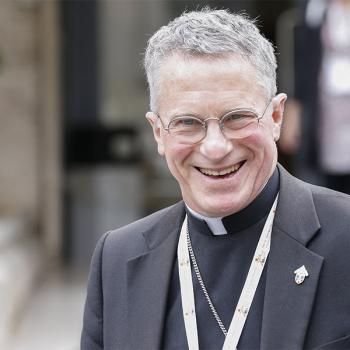As we think of [Jesus] we can achieve the difficult and unnatural: we can love those that hate us, give good for evil, and blessing for cursing (Matt. 5:44), remembering that we are not to dwell on the evil in men, but look to the image of God in them. This image covers and obliterates their faults, and by its beauty and dignity draws us to love and embrace them. (John Calvin, The Institutes of Christian Religion 3.7.6.)
Last week we explored the Christian Realist tradition out of which President Barack Obama made peace with the decision to eliminate Al Qaeda leader Osama bin Laden. Christian Realism, as we observed, represents a pragmatic faith that notes the presence of evil in the world and suggests that Christians can and must sometimes do things that the tradition teaches against—killing others of God's children in warfare, for example—in order to safeguard our families and our nation.
This week we're going to look at other theologies that have shown their faces: the American Christian notion of Holy War, which accounted for some of last week's celebration and grim pronouncements of satisfaction, and also the tradition of Christian Pacifism, which argues that we have an absolute call to peace, no matter what the circumstances.
Holy War
I'm not saying I like it, but the Christian tradition does contain a Holy War strand. Some readers of the Hebrew Testament have always pulled forward the holy wars in the book of Joshua for the conquest of the Holy Land. For these readers, God is on one side, the enemies of God on the other. It can be hard—particularly for people who read the Bible literally—to imagine that any part of the Bible is not directly applicable to our lives, so I've seen a number of folks justifying our wars in the Middle East, and our mission against bin Laden, in terms of a theology based on the warfare of the Children of Israel to take possession of the land God had given them.
That theology got carried over into the Middle Ages. Ambrose of Milan argued that when Rome's military stood up against the menacing barbarians, the legionaries represented God's hand at work. Bernard of Clairvaux, in a tract on the duties of the militant Knights Templar, delineated Holy War in a way we may recognize in our own thinking about warfare:
The soldier of Christ kills safely; he dies the more safely. He serves his own interests in dying, and Christ's interests in killing. . . . He is the instrument of God for the punishment of malefactors and for the defense of the just. Indeed, when he kills a malefactor this is not homicide, but malicide, and he is accounted Christ's legal executor against evildoers.
It was pretty clear to Christians who the enemies of God were: God hated the Muslim invaders, God hated the Muslim occupiers of the holy sites in Palestine, and Christian leaders all the way up to the top affirmed this. Pope Urban II, in his Crusade sermon of 1095, preached that the Franks were a race beloved by God, and the Muslims a race wholly alienated from God. They were not Children of God; they were not made in the Image of God.
They were Children of the Devil.
And so their deaths didn't matter; in fact, they were approved by God, desired by God.
Now, I do not believe this for a moment.
But some people do. Today. Still.
Love for our nation also gets caught up in this unholy Holy War matrix. A healthy ration of Holy War comes from the natural impulse toward American patriotism. And even more can grow out of American exceptionalism.
Ira Chernus wrote recently in the Journal of the American Academy of Religion that, at least where the War with Iraq was concerned, American secular religion and Christian religious beliefs often fused "in a unified worldview and value system." He also observed that many of us view America as God's chosen people (exceptional, we might say), believe in America's innocence and superiority, and, as we noted about our varied responses to bin Laden's death, call on just war, holy war, and Christian humanist theologies to make sense of war and conflict (866-867).
When God's will conforms perfectly to our desires—or to America's will—I am suspicious that we are inviting God to condone our actions, rather than conforming our actions to what God desires, and I find this particularly true in the Sermon on the Mount where Jesus redefined the rules of justice to become rules of love:
You have heard that it was said, "You shall love your neighbor and hate your enemy."





